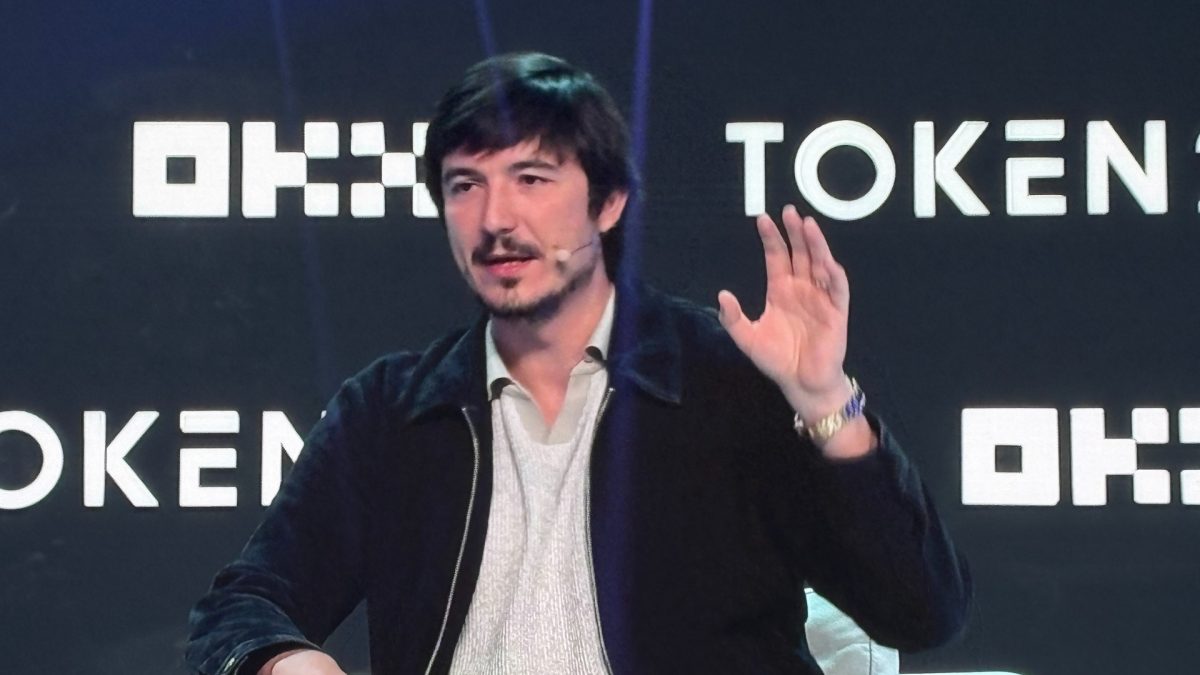Tokenization framework in most major markets by 2030, Robinhood CEO predicts
Quick Take Vlad Tenev, during a discussion at Token2049 in Singapore, said he expects to see a framework for asset tokenization in major markets in the next five years. Tenev also described prediction markets as a hybrid of sports betting, exchange-traded products and traditional news, with the potential to revolutionize these industries.

Most major markets could establish a framework for asset tokenization in the next five years, Robinhoo d CEO Vlad Tenev said during an on-stage discussion at Singapore's Token2049 conference on Thursday.
"I think tokenization is like a freight train," Tenev said. "It can't be stopped and eventually it's going to eat the entire financial system."
Tenev estimated that it may take a decade or more for nearly the entire world to participate in tokenization, while noting that the U.S. may take longer than other regions to reach full adoption.
The Robinhood CEO said that the primary challenge for the U.S. lies in its existing financial infrastructure, which already functions effectively. He drew an analogy to Japan's bullet trains, and said that the U.S. has little incentive to build such high-speed systems because it already has medium-speed trains that work sufficiently.
"If you can get from point A to point B in three hours, getting there in two hours might not be worth the incremental investment," Tenev said. "So in the same way, we have a financial system that works decently well in the U.S. Maybe you can't trade tokenized stocks, but Robinhood's done a pretty decent job making stocks available to the mass market."
Tenev also described stablecoins as the most basic form of tokenized assets, saying that dollar-pegged stablecoins are gaining traction in the U.S. due to their potential to reinforce the dollar's dominance abroad. He said the same trend is likely to extend to tokenized stocks, real estate and other assets, predicting that tokenization could eventually become the default way to gain exposure to U.S. stocks outside the country.
"I actually think cryptocurrency and traditional finance have been living in two separate worlds for a while, but they're going to fully merge," Tenev said. "I think that crypto technology has so many advantages over the traditional way we're doing things that in the future there's going to be no distinction."
Prediction markets
Another major focus for the U.S. financial giant app is the prediction markets, which drew heightened interest during the last U.S. election. Since launching its prediction market platform in late 2024, Robinhood has recorded more than four billion event contracts traded.
"A lot of people had skepticism about whether this would only be an election thing, whether it's like prediction markets are going to be relevant every four years, but not so much in between," Tenev said. "It's really much bigger than that. And now we have prediction markets on sports and American football and college football have been particularly popular there. You have prediction markets on culture. You have them on AI."
Tenev nonetheless acknowledged that event contract markets face criticism, primarily because their ambiguous nature has led some to liken them to gambling. He indicated that such criticism is natural, as it happens with other new innovations.
"I think the prediction markets has some similarities with traditional sports betting and gambling, there's also similarities with active trading in that there are exchange-traded products," Tenev said. "It also has some similarities to traditional media news products because there's a lot of people that use prediction markets not to trade or speculate, but because they want to know."
It was reported earlier this week that Robinhood is looking to expand its prediction market platform outside the U.S., speaking to overseas regulators including the UK's Financial Conduct Authority.
Disclaimer: The content of this article solely reflects the author's opinion and does not represent the platform in any capacity. This article is not intended to serve as a reference for making investment decisions.
You may also like
Spot Bitcoin ETFs Stumble: $60.5 Million Flees in Sharp Reversal
US Spot ETH ETFs Surge Back with $35.5 Million Inflow Reversal
MetaMask Unleashes Game-Changing Perpetual Futures Trading on Mobile
